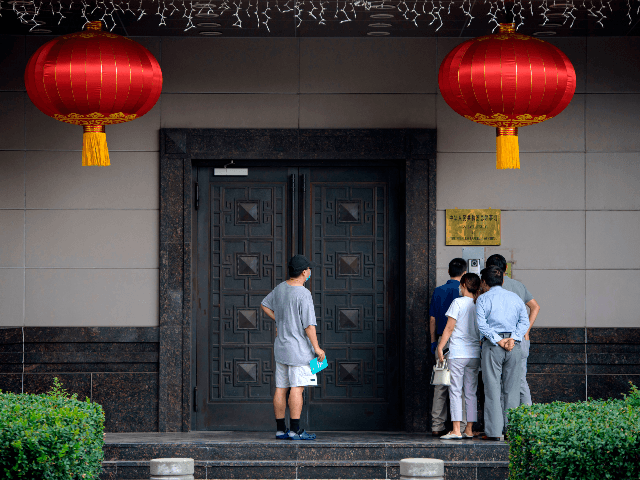China’s state-run Global Times on Wednesday condemned the United States for its “reckless and dangerous” shuttering of the Chinese consulate in Houston, Texas, and promised Beijing’s retaliation would bring “real pain” to America.
Chinese Foreign Ministry spokesman Wang Wenbin said on Wednesday that the Houston consulate closing was a “political provocation unilaterally launched by the U.S. side” that “seriously violates international law.”
“As the U.S. flagrantly drums up stigmatization and fans hatred against China, our embassy in the U.S. recently has even received bomb and death threats on Chinese diplomatic missions and personnel in the U.S.,” Wang claimed.
The Global Times used the comments from the Foreign Ministry as the basis for some belligerent editorializing:
The Chinese side strongly condemned the move, and urged the US to immediately correct its mistakes. Otherwise, China will make a legitimate and necessary response, the spokesperson said.
For some time, the US has been attacking and launching smear campaigns against China, and unreasonably made trouble for staff members at Chinese consulates. The latest move to ask China to close its Consulate General in Houston is an unprecedented escalation of its moves against China, the spokesperson said.
In October 2019 and June 2020, the US side twice imposed restrictions on Chinese diplomatic staff in the US, opened Chinese diplomatic packages privately on many occasions, and seized Chinese official supplies, the spokesperson said.
As a result of the recent indiscriminate stigmatization and incitement of hatred by the US, bomb and death threats have been made against Chinese diplomatic missions and personnel in the US, the spokesperson said.
The website of the US Embassy in China often publishes articles openly attacking China. It is clear who is interfering in other countries’ internal affairs and who is infiltrating and inciting confrontations, he said.
The Global Times complained in detail about the “unprecedented” U.S. action and the “serious escalation in bilateral confrontations” it represents, but was somewhat less specific about the “countermeasures” that will come from the regime in Beijing.
The most likely form of retribution would be China closing a U.S. consulate somewhere. The Global Times suggested shutting the one in Hong Kong, which would supposedly be “a move which is conducive for Hong Kong’s stability, as U.S. consulate staff there have played a role in the months-long unrest in Hong Kong last year.” 80 percent of Chinese “netizens” supposedly wanted to close the American consulate in Hong Kong in an online poll conducted by the Global Times this week.
Leaving aside the latest round of regime propaganda about the Hong Kong pro-democracy movement being a foreign subversion operation, Hong Kong is rapidly losing its value as a business hub after China shredded its autonomy with a heavy-handed “national security law” at the beginning of the month. The exodus of foreign commercial interests would likely accelerate if Beijing started closing foreign consulates for political reasons.
The other possibility mentioned by the Global Times would be closing the U.S. consulate in Wuhan, but the Chinese Communist paper gingerly admitted that some of the consulate staff has yet to return after the facility was evacuated in January when the coronavirus pandemic exploded out of Wuhan, so closing that particular diplomatic installation wouldn’t send much of a message.
The South China Morning Post (SCMP) on Thursday cited sources who said the U.S. consulate in Chengdu is more likely to be closed in retaliation for the shuttering of the Chinese consulate in Houston.
“The US consulate in Chengdu opened in 1985 and is strategically important because it covers the country’s southwestern region, including the provinces of Sichuan, Yunnan, Guizhou, Tibet autonomous region and Chongqing,” the SCMP noted.
The Chengdu consulate is also important to U.S. concerns about Xinjiang, where China is brutally oppressing the Uyghur Muslim population, and has historic significance as the scene of a 2012 defection attempt that touched a major Chinese political crisis.
A big part of China’s propaganda response to the Houston action involves pretending to be completely surprised that anyone could possibly think anything untoward was happening at the Chinese consulate, which in truth has long been a well-known hive of espionage activity.
The Global Times took feigned incredulity to new heights in an editorial that wondered if the U.S. government has been driven mad by the 2020 election, or if President Donald Trump took the action to gin up anti-China sentiment, or if the U.S. acted on scurrilous rumors that China was about to block some of its diplomats from returning to facilities such as the one in Wuhan.
The Global Times then doubled down on some scurrilous rumors of its own, insisting that Chinese diplomatic facilities in the U.S. have tiny staffs that can barely handle “the needs of daily routine work,” never mind the demands of running espionage operations – unlike the U.S. consulates in Hong Kong and Macau, which boast “thousands of diplomats and employees” and have been developed by the sinister Americans as “a fortress to attack China.”

COMMENTS
Please let us know if you're having issues with commenting.